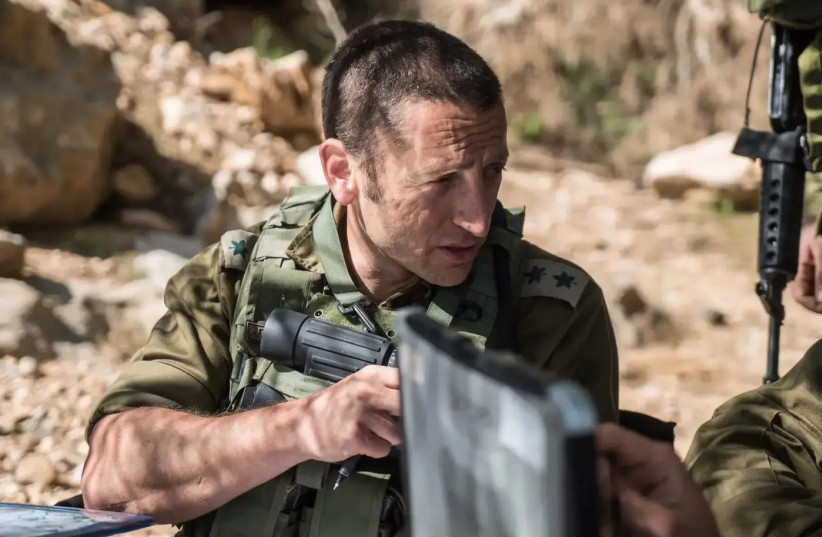Speeches are a tool and a showcase for politicians, educators, and rabble-rousers. They can be inspiring and mobilizing, or polarizing. Here in Israel, senior army officers also make speeches.
Last month, as the outgoing head of the IDF Central Command Maj.-Gen. Yehuda Fuchs marked his resignation, he addressed remarks critical not of his commanders or his troops but of the local and spiritual leadership in Judea and Samaria (Yesha), the civilians his job was to keep safe and secure.
Fuchs’ opinion on violence directed by Jews at local resident Arabs was that the leadership of the Yesha communities did “not find the strength to come out openly and act according to the Jewish values that they are educating their children on.” He then added, theologically, “This is not Judaism to me. At least not the one I grew up with in my father and mother’s house. This is not the way of the Torah. It is about adopting the tactics of the enemy and following their rules.”
Fuchs may be 100% correct. Or he may not.
What should be viewed as incorrect is the use of an army platform to comment on political, social, and religious concerns. All Fuchs needed to do was wait a few days and then share his opinion as a civilian.

Incidentally, as Rescuers Without Borders reported, in the period between January and June of this year, some 3,300 acts of terror were committed by Arabs against the Jews living in Judea and Samaria. Thirteen Jews were murdered. The terror structure, despite impressive operations, is increasing, with more shooting incidents. Fuchs could have expanded on those aspects in his speech.
The phenomenon of military leaders – successful in the field or less so – becoming an unnecessary interference here in Israel is growing.
The intricacies between civilian and military bodies
In a democracy, it is the civilian echelons that supervise the military, not the other way around. America’s Gen. Douglas MacArthur learned that lesson after making controversial statements to the media at the end of 1950, concerning the war in Korea. On April 11, 1951, he was informed that president Harry Truman, his commander-in-chief, had concluded that MacArthur was “unable to give his wholehearted support to the policies of the United States Government... in matters pertaining to his official duties” and had relieved him of his commands.
We have witnessed a similar incident here in Israel.
Eight years ago, on May 4, 2016, then-IDF deputy chief of staff Yair Golan (head of The Democrats party founded last month) made a speech that halted his promotion. Speaking at a Holocaust Remembrance Day ceremony at the Ghetto Fighters’ Kibbutz, he declared, “If there’s something that frightens me about Holocaust remembrance it’s the recognition of the revolting processes that occurred in Europe in general, and particularly in Germany, back then – 70, 80, and 90 years ago – and finding signs of them here, among us today, in 2016.”
Golan added that the Holocaust “must make us think deeply about the responsibility of leadership, the quality of society, and it must lead us to fundamental thinking about how we, here and now... ought to discuss our ability to uproot the seeds of intolerance, violence, self-destruction, and moral deterioration.”
So political and divisive was that speech that he lost his shot at becoming the IDF’s next commander-in-chief. It is quite possible that his recent prominent anti-government backlash activities – such as besieging the prime minister’s wife, Sara Netanyahu, at her hairdresser, alongside other extraordinary actions and comments during the anti-Netanyahu demonstrations – are a sort of revenge for that slight.
In any case, Golan’s extremist remarks have now led to a police investigation into his call for military service refusal.
A third speech came from Brig.-Gen. Barak Hiram, incoming commander of the Gaza Division, earlier this month. Already a target of criticism from the Left for failing to protect Kibbutz Be’eri, he further stoked their anger, noting that:
“The gap between Israel 2023 and Israel 2024 is beyond imagination. Our firm stand is in complete contrast to the Israeli culture that has developed here – which seeks everything ‘now’; to ‘make a [hi-tech monetary] exit’; to realize momentary profits; a society that seeks to be light and energetic, detached from past commitments and from the burden of its future; and above all devoted to the moment, to the present. Our enemies recognized this and believed that this would be the opportune time for our destruction.”
Although the issue of this generation’s youth, denominated “Tik-Tokers,” has been a constant on talk shows as has been whether Hamas was influenced by the discord and dissension of these past years, these, again, are matters better left out of the IDF’s sphere.
We need no more diversions.
The responsibility of the military is to defend the country and its citizens and to wage war successfully. There is no need for army officers to preach or lecture to the public on political and social matters, whether from the Right or the Left.
The writer is a researcher, analyst, and opinion commentator on political, cultural, and media issues.
